“Books are our co-teachers. When we bring books into the classroom we are never lonely.” @JoEllenMcCarthy, #NCTE16
We’re back—from NCTE 2016, that is! This annual conference, which took place in Atlanta, GA last weekend, couldn’t have come at a better time of year. Over and over, we heard from educators who connected with their tribe, discovered fresh ideas and found the inspiration they needed to return to their students and classrooms with renewed passion and enthusiasm.
Even if you weren’t able to attend NCTE 2016 in person, we’ve rounded up key takeaways from several of the conference’s most interesting sessions. And if you were lucky enough to be there too, please share your own takeaways in the comments!
NCTE 2016 Sessions: Friday, November 18th
1. Mirrors and Windows: Literature as Advocacy for Ourselves and Others
Key Takeaway: Build your classroom library for your students. Find out how they see themselves and then find out what they’re reading. Where are the gaps?
Key Takeaway: If you’re looking for books focused on literature as advocacy, Lesley Roessing and Sarah Donavan have compiled two Mirrors and Windows Booklists for students.
2. Listening in a Digital Age with Penny Kittle and Kelly Gallagher
Key Takeaway: Classrooms used to be set up to avoid discussion, but today’s classroom should be built to create collaboration. They should be full of life and discovery. Kids aren’t born knowing how to work in groups, so we have to give them the social skills they need to do so.
3. Text Complexity, Close Reading and Disciplinary Literacy: Getting to the core of common core state standards
Key Takeaway: Summarizing texts in content areas like science, history and math removes the students’ ability to practice text interpretations and comprehension. Many teachers make the mistake of creating PowerPoints or outlines that summarize a text for students before they have a chance to make their own meaning from the original.
4. Building Avid Readers
Key Takeaway: Lack of reading achievement at all grade levels is a common issue. Kristie Ennis, a high school instructional coach, believes that independent reading is the solution. She says we must give students time to read during the academic school day, every day.
(And we couldn’t agree more!)
5. The Impact of Leveling: Advocating for Children’s Positive Experiences from the Start
Key Takeaway: While less play and more seat work has become a trend in some pre-K classrooms, students must first have a relationship with books before they can read books. It’s not always about the book itself, but rather about what a student takes away from the book. The littlest learners can still have relationships with books—even if they are not conventionally reading.
6. Great Escapes: A Panel on Hooking Reluctant Readers through Mystery, Adventure and Humor
Key Takeaway: The key to writing for reluctant readers is writing just the nugget of a scene, nothing more. Short, to-the-point writing helps to keep the reader hooked and wanting to move on to the next piece. Humor, mystery and adventure genres are all good choices to hook reluctant readers:
Humor is a great way to introduce students to poetry.
Adventure texts with a great beginning will hook readers early on
Mysteries engage readers from the start because they know to look for clues
NCTE 2016 Sessions: Saturday, November 19th
7. 2016 Notable Children’s Books in the Language Arts
Key Takeaway: Every year, 30 new and notable K-8 fiction and nonfiction titles are selected by the Children’s Literature Assembly. Books on this year’s list include: Red: A Crayon’s Story (Grades P-3), The Thing About Jellyfish (Grades 3-7, Level Y, Lexile 740) and Kate Messner’s How to Read a Story (Grades K-3, Lexile AD480).
8. The Achievement Gap: Realities and Implications
Key Takeaway: Grit is more closely correlated to achievement than any other cognitive function. Students in high poverty schools have high social grit but low academic grit, while other students may have high-achieving academic grit but low social grit.
Educators must build systems of access and a culture of success by giving all students autonomy, challenge, choice and engagement. Independent reading is the best avenue for this success. (One more reason to make independent reading a priority!)
9. Reading Aloud National Science Teachers Association (NSTA) Outstanding Trade Books
Key Takeaway: Interested in adding some of the newest and best science titles available to your classroom library? You’ll want to be familiar with this list from NSTA—Outstanding Science Trade Titles for Students K-12: 2016.
10. The Power of Postmodern and Wordless Picture Books for Reading and Writing Instruction
Key Takeaway: If reluctant readers or students are having a difficult time creating a story and making inferences with wordless picture books, show them an animated short film—ask all the same questions you would with a picture book. This will help model how to think about stories when using wordless picture books.
NCTE 2016 Sessions: Sunday, November 20th
11. Sunday General Session
Key Takeaway: Author Brad Meltzer spoke about writing to give his children heroes, and asked that all teachers think about their own legacy. His message to educators: “Ordinary people change the world.”
12. Storytelling and Advocacy: Empowering Our Students and Ourselves through Writing
Key Takeaway: Use fiction and nonfiction title pairings to explore social issues. Before starting the title, discuss the book characters and their traits. Explain the overarching problem(s), then discuss which character will likely be the hero, make the choice, etc., and what traits will help them do that. Ask students what they would do in a given situation and what traits they possess that could help them.
13. Mentor Texts as Advocacy Builders: Teaching K-12 Students to Advocate for their Own Learning
Key Takeaway: Use real examples by students of similar age to help promote writing. Two great resources for finding writers to appeal to your students are Teen Ink and Apprentice Writer. Build skills by helping students learn how to research submission guidelines, content applications, create query letters and the process of becoming published.
Key Takeaway: Kids need time to write that’s totally risk-free. When students have the freedom to write, where nothing is graded and there is no assessment, there is an opportunity for discovery. Similarly, mentor texts are important for simply inspiring ideas.
Did you attend NCTE16 in Atlanta? If so, share your favorite sessions (and what you learned from them) in the comments!



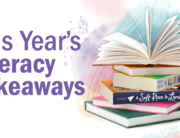
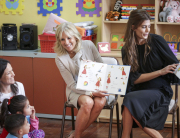
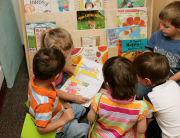
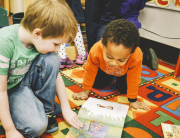
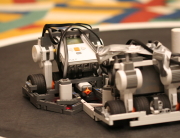
I went to Reaching Diverse Learners through Grammar. I loved Sean Ruday’s ideas about using song lyrics to help students understand grammar concepts!